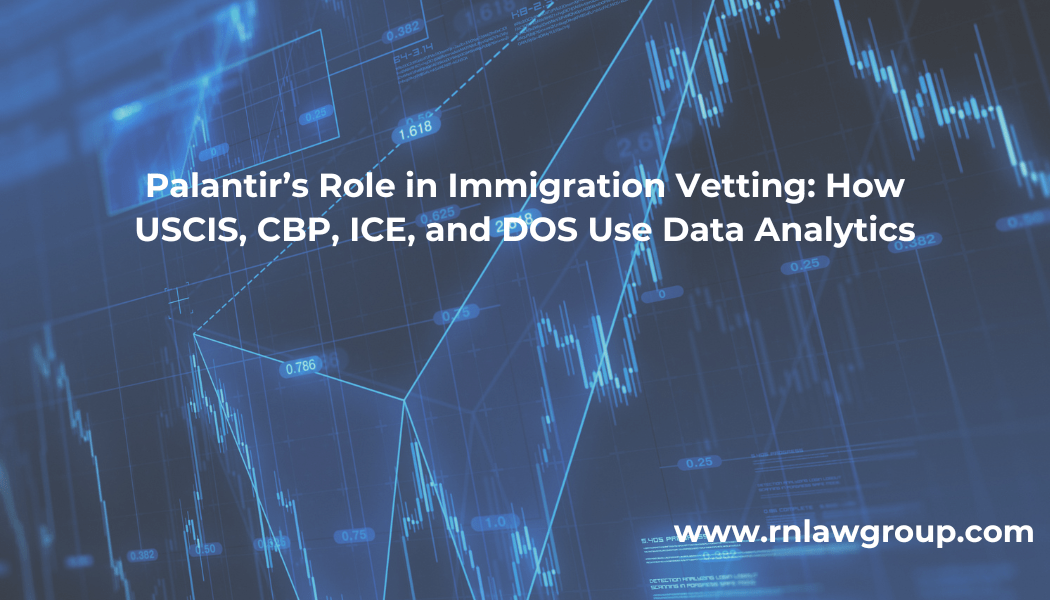
Palantir’s Role in Immigration Vetting: How USCIS, CBP, ICE, and DOS Use Data Analytics
In recent years, Palantir Technologies has become a central figure in the U.S. immigration landscape, significantly influencing how agencies like USCIS, CBP, ICE, and the Department of State handle immigration applications. Individuals seeking employment-based green cards, non-immigrant visa holders, and those applying for visa stamping abroad should understand how Palantir’s data analytics tools affect their immigration journey.
Enhanced Fraud Detection and Vetting by USCIS
U.S. Citizenship and Immigration Services (USCIS) employs Palantir’s advanced analytical platforms to detect inconsistencies and potential fraud across various immigration applications. Employment-based immigration applicants, particularly those pursuing H-1B, L-1, EB-1, EB-2, or EB-3 classifications, should ensure accuracy across all submitted documentation. Palantir’s tools integrate databases from multiple government sources, including previous visa filings, biometric data, employment records, and even social media. Minor discrepancies, such as inconsistent job titles, salary data, or employment history, can trigger red flags, leading to Requests for Evidence (RFEs) or administrative investigations by USCIS’s Fraud Detection and National Security Directorate (FDNS).
Applicants should proactively maintain clear, consistent records, including detailed employment letters, pay stubs, tax documents, and education certificates, to avoid unintended scrutiny.
CBP’s Enhanced Border Vetting Procedures
Customs and Border Protection (CBP) utilizes Palantir’s Analytical Framework for Intelligence (AFI) to evaluate the admissibility of non-immigrant visa holders at U.S. ports of entry. Individuals entering the U.S. on visas such as F-1, J-1, H-1B, or B-1/B-2 must understand that CBP officers now possess comprehensive real-time access to a broad array of information, including travel histories, previous immigration records, criminal checks, social media activities, emails, WhatsApp and Telegram chats, cellphone call logs, and Instagram accounts.
Travelers should expect potential secondary screenings, especially if their travel patterns exhibit anomalies or if they have connections—real or perceived—to individuals flagged by CBP systems. It is advisable to carry clear supporting documents, including employment verification letters, recent pay slips, I-20 forms, or invitation letters, to expedite the entry process and clarify any possible misunderstandings promptly.
ICE’s Enforcement and Data Integration
Immigration and Customs Enforcement (ICE) extensively leverages Palantir’s data analytics, particularly through platforms like the Investigative Case Management (ICM) system. Non-immigrant visa holders must be aware that ICE actively monitors compliance with visa conditions, focusing particularly on overstays, unauthorized employment, and other status violations. Palantir’s analytical tools allow ICE to access and analyze data from various sources, including emails, WhatsApp, Telegram conversations, phone call records, social media platforms like Instagram, and other messaging apps.
Visa holders, especially in statuses like OPT, STEM OPT, or H-1B, must diligently adhere to their authorized terms, maintaining current documentation and promptly updating employers and addresses through SEVIS or USCIS. Minor oversights, like delayed address updates or gaps in employment records, can be flagged by ICE’s integrated monitoring systems, potentially triggering investigations or adverse immigration consequences.
Social Media Vetting by the Department of State
The Department of State has significantly intensified its vetting processes, particularly in the visa stamping context abroad. All applicants undergoing visa interviews overseas—particularly for F-1, J-1, H-1B, L-1, and B visas—are subject to enhanced social media scrutiny facilitated by Palantir’s analytical capabilities. Consular officers now routinely examine applicants’ social media accounts, emails, messaging apps (WhatsApp, Telegram), cellphone call logs, and Instagram for indications of fraud, misrepresentation, or security concerns.
Applicants are advised to review their online profiles thoroughly, ensuring public content aligns accurately with their immigration application details. Publicly visible posts or affiliations suggesting any form of extremist views, misrepresentations of job duties, or inconsistencies in stated intentions (such as claiming tourist status but posting about employment intentions in the U.S.) can result in visa denials or administrative processing delays.
Recommendations for Non-Immigrant and Employment-Based Applicants
Given the sophisticated reach of Palantir-driven vetting procedures, applicants should:
- Maintain rigorous accuracy and consistency in all immigration forms and documents.
- Regularly review and manage online profiles and messaging app usage to ensure consistency with immigration declarations.
- Be prepared for potential secondary questioning during border entries and visa interviews.
- Promptly update personal information, employment details, and status changes as required by immigration regulations.
Understanding Palantir’s growing role in immigration vetting processes empowers visa applicants and employment-based immigration candidates to proactively navigate potential challenges, ultimately facilitating smoother interactions with USCIS, CBP, ICE, and DOS.
By: Rahul Reddy, Immigration Attorney
Rahul Reddy is the founding partner of Reddy Neumann Brown PC. He founded our firm in 1997 and has over 28 years of experience practicing employment-based immigration. Rahul‘s vast knowledge of the complex immigration system makes him an invaluable resource and an expert in the field. His personal experience with the immigration system has made him empathetic to each of his clients’ cases and empowered him to help others achieve the American Dream.
Rahul‘s dedication to serving the immigrant community is evident, from his daily free conference calls to his weekly immigration Q&As on Facebook and YouTube Live. He is an active member of the immigrant community and one of the founders of ITServe Alliance. He has been a member of American Immigration Lawyers Association since 1995.

